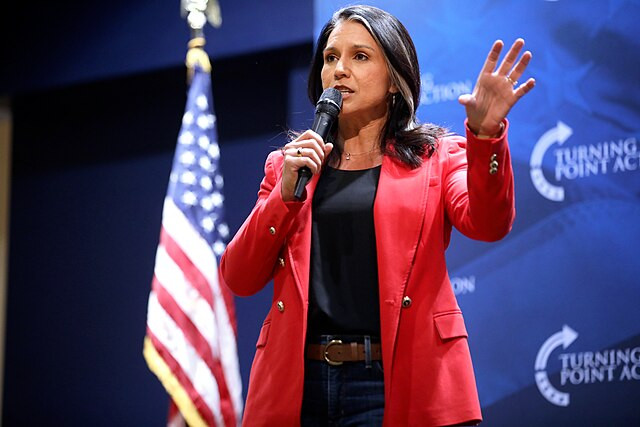Republican lawmakers strongly pushed back Sunday against growing criticism from Democrats over President-elect Donald Trump's nomination of Tulsi Gabbard as Director of National Intelligence (DNI). Leading Democrats, including Senator Tammy Duckworth of Illinois, have raised concerns about Gabbard's controversial foreign policy positions, including her 2017 meeting with Syrian President Bashar al-Assad, a close ally of Russia and Iran.
"I think she's compromised," Duckworth said during an appearance on CNN's State of the Union. She pointed to Gabbard's actions as a congresswoman, which included publicly questioning U.S. intelligence claims that Assad used chemical weapons in Syria. Duckworth added, "The U.S. intelligence community has identified her as having troubling relationships with America's foes. My worry is that she couldn't pass a background check."
Republicans swiftly defended Gabbard, rejecting the accusations as baseless political attacks. Senator Markwayne Mullin of Oklahoma rebuked Duckworth's comments, calling them "ridiculous and outright dangerous." Speaking on CNN, Mullin said, "Tulsi Gabbard is still a lieutenant colonel in the United States Army. She is a true patriot of the United States, and there's no reason why the Democrats are going after her, other than the fact they're upset that she left their woke party."
Gabbard, who left the Democratic Party in 2022, has faced bipartisan scrutiny for her foreign policy stances. As a congresswoman, she controversially suggested that the U.S. and NATO ignored Russia's "legitimate security concerns" prior to the invasion of Ukraine and described the conflict as avoidable. Critics argue her statements echo Kremlin talking points, which Gabbard has denied, saying her goal is to question interventionist policies and promote diplomacy.
Senator Elizabeth Warren of Massachusetts added fuel to the controversy by claiming Gabbard is "in Putin's pocket," though she offered no evidence to support the allegation. Meanwhile, Representative Adam Schiff of California, a newly elected senator, took a more measured stance, describing Gabbard's judgment as "very questionable." Speaking on NBC's Meet the Press, Schiff warned, "The problem is if our foreign allies don't trust the head of our intelligence agencies, they'll stop sharing information with us."
Gabbard's nomination has also unsettled some members of her own party. Senator James Lankford, a Republican from Oklahoma, said he has "lots of questions" for Gabbard during her confirmation hearings. "We will want to know what the purpose was and what the direction for that [meeting with Assad] was as a member of Congress," Lankford said.
Duckworth also questioned Gabbard's qualifications, emphasizing her limited intelligence experience. "When she was in Iraq, she was a medical records clerk E4, below the rank of sergeant," Duckworth noted. "I don't know of any intelligence work that she has done."
Gabbard's supporters, however, argue that her military service and independent views make her well-suited to shake up an intelligence community they say has grown overly politicized. Senator Eric Schmitt of Missouri dismissed the criticism as "totally ridiculous" and called the accusations "a slur."
Trump's selection of Gabbard reflects his broader strategy of appointing individuals he views as disruptors. Gabbard's anti-interventionist positions and vocal critiques of U.S. foreign policy have long made her a polarizing figure. During her time in Congress, she described herself as an advocate for peace, while also defending controversial decisions like meeting Assad, which she called a "fact-finding mission."
This article including reporting from AP news, and CNN.






